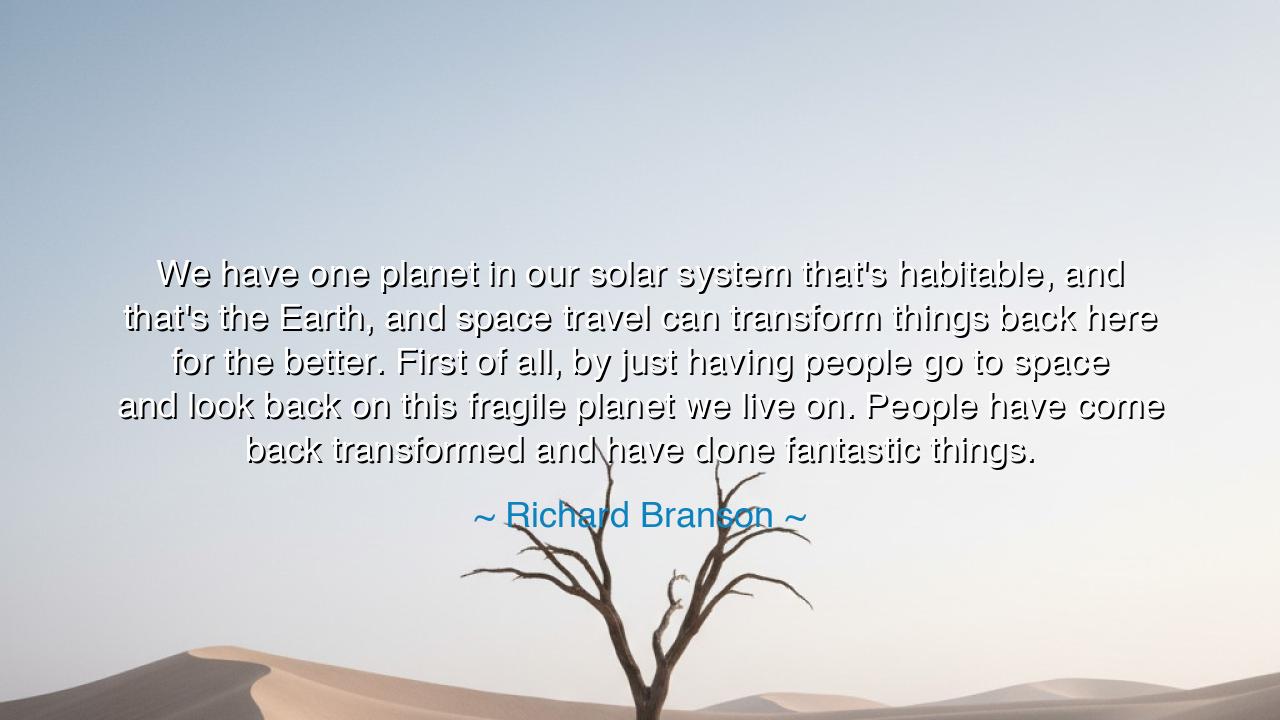
We have one planet in our solar system that's habitable, and
We have one planet in our solar system that's habitable, and that's the Earth, and space travel can transform things back here for the better. First of all, by just having people go to space and look back on this fragile planet we live on. People have come back transformed and have done fantastic things.






Hear now the words of Richard Branson, voyager of commerce and dreamer of the stars, who proclaimed: “We have one planet in our solar system that’s habitable, and that’s the Earth, and space travel can transform things back here for the better. First of all, by just having people go to space and look back on this fragile planet we live on. People have come back transformed and have done fantastic things.” In these words lies not only the marvel of exploration, but also the reminder of stewardship: that our journeys beyond are meant not to abandon this world, but to return with renewed reverence for it.
The origin of this saying rests in the space age itself, for when humankind first broke the chains of gravity and gazed upon Earth from the void, a revelation occurred. The astronauts of Apollo spoke of the overview effect, a profound shift of consciousness brought by seeing the planet as a small, glowing sphere suspended in darkness. They saw no borders, no nations, only a single home. Branson, who has championed commercial spaceflight, echoes this ancient yet modern wisdom: that to go outward is also to come inward, and that discovery among the stars must teach us humility upon the Earth.
Consider the tale of Apollo 8 in 1968, when the crew captured the famous photograph “Earthrise.” As the blue orb rose over the gray horizon of the Moon, the image was sent back to Earth, igniting the environmental movement. People suddenly saw their home as both beautiful and perilously fragile. From that moment, the call to protect forests, seas, and skies grew louder. Here we see the truth of Branson’s words: the voyage outward transformed life inward, birthing movements and actions that reshaped the destiny of nations.
The wisdom of this vision is not new. The ancients, gazing at the heavens, spoke of the Earth as sacred, entrusted to humankind as both dwelling and temple. Yet in the age of industry and conquest, man forgot this duty, and the soil grew poisoned, the rivers darkened, the air choked with smoke. It was only by leaving Earth, by seeing it from afar, that we began to remember again. Thus, space is not only a realm of conquest but also a mirror, showing us who we are and what we must protect.
Branson reminds us also that those who have gone to space return changed. Astronauts have spoken of deepened compassion, of visions that drove them to champion peace, to work for unity, to dedicate themselves to the preservation of life. Some have founded movements, others have spoken with prophetic voices, but nearly all testify to transformation. The infinite silence of the cosmos makes the beating heart of Earth appear infinitely precious.
Therefore, O listener, the lesson is clear: do not look to the stars as escape, but as teachers. Let exploration kindle reverence, not arrogance. Our voyages beyond are not to replace Earth, but to remind us of its irreplaceability. The fragile planet we inhabit is the cradle of our being, and though we may reach the Moon, Mars, and beyond, our duty to Earth will remain eternal.
Practical action lies before you. Guard the land and waters where you dwell. Support the causes that protect the Earth’s balance. Learn from the astronauts who speak of unity and compassion, and live as though borders are less than the bonds of humanity. Even if you never travel to the stars, you may still awaken to the truth they reveal: that the Earth is one, fragile, and shared by all.
So remember the wisdom of Richard Branson: we have but one habitable planet, and though space travel may inspire us, its greatest gift is not escape but transformation. Let us look back from the stars, even in imagination, and see our world as it truly is—a jewel in the darkness, entrusted to our care, waiting for us to protect it with all the strength of our souls.






AAdministratorAdministrator
Welcome, honored guests. Please leave a comment, we will respond soon